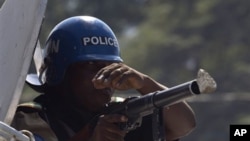The United Nations says continued testing of all of its bases and facilities in Haiti for cholera, continues to be negative. The U.N. began the testing after peacekeepers were blamed for causing an outbreak of the disease.
More than 1,100 people have died in Haiti since the outbreak began last month, and more than 18,000 others have been hospitalized.
The U.N.'s top envoy to the country, Edmond Mulet, has called for calm, asking demonstrators to unblock roads, bridges and airports to allow medical and humanitarian assistance to reach those who need it.
Some Haitians have blamed U.N. peacekeepers from Nepal for bringing the water-borne disease to their country. About 1,300 of the 12,000 peacekeepers in Haiti are from Nepal, where there has been an upsurge in cholera. But U.N. Peacekeeping spokesman Nick Birnback tells VOA there is no evidence to support such an accusation.
"According to the Nepalese battalions that are there, none of the soldiers have shown any symptoms of cholera. The tests of the premises and the outputs have consistently proven negative - there hasn't been a single positive test. So we think there is no conclusive evidence that shows that this contagion directly comes from this base," he said.
He said if a soldier or any other U.N personnel showed symptoms of cholera they would be quarantined and treated. "Were there to be a positive test by any of our blue helmets [ie, peacekeeper], or in fact anyone serving with United Nations in Haiti, that does not prove that they brought it in, it could mean that they got through the fact that they are living in an area that is afflicted by an epidemic," he said.
Birnback says the U.N. Mission in Haiti, known by its French acronym MINUSTAH, is now focusing its attention on preventing the spread of the disease and bringing medical and other help to those who need it, while helping secure the country for the presidential elections later this month.
UN Facilities, Peacekeepers in Haiti Test Negative for Cholera




